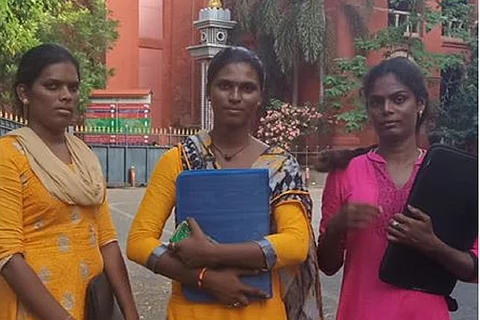

The Tamil Nadu government's home department has issued an order granting age relaxation for transgender persons applying for posts in the state's police subordinate services. The order states that the guidelines will be similar to the age relaxation provided to Scheduled Caste and Scheduled Tribe candidates who apply for recruitments through the Tamil Nadu Uniformed services recruitment board.
The government order comes following a writ petition filed by K Aradhana, a trans woman in 2018. She was 29 years old when she attempted to apply for recruitment online, but her application was not accepted because she was above the prescribed age of 26. The court in its interim order directed the recruitment board to keep one post vacant, and to entertain the application of the petitioner regardless of the age, subject to the result of the writ petition.
K Aradhana
The court then pointed out: "If the intent behind the orders of the Supreme Court of India in the National Legal Service Authority vs Union of India case in 2014 is to be carried forward, then we see absolutely no reason why reservation in age, which is applicable to destitute widows and ex-servicemen and the like, should not be extended to transgender persons."
The Supreme court order had stated that since the transgender community faces discrimination, prejudice and violence from various sections of the society, they should be given age relaxation similar to what marginalised groups get.
Arardhana's manual application was then accepted and she appeared for the written examination. And while her writ petition was pending, three more transgender candidates – Deepika, Thenmozhi and Saratha – also filed petitions before the court seeking age relaxation for attending the common recruitment for the post of Grade II police constables/jail warders and firemen for the year 2019. The High Court allowed them to write the exams as well.
But while the High court grouped transgender candidates with marginalised groups that include SC/ST communities, disabled and destitute women, the government, based on this court order and inputs from the Director General of Police, only took one of these criterias into consideration.
The order on June 29 stated, "The government has carefully examined the proposal of the Director General of Police/ Head Police force. It is observed that though certain privileges have been made for the welfare of third gender candidates, the observation made by the honourable High Court of Madras in its order for the upliftment of the third gender candidates has been considered and accordingly, in compliance with the Honourable High court of Madras, the government hereby direct that the third gender candidates shall be granted age relaxation as provided to the SC/ST candidates for the recruitments through Tamil Nadu Uniformed Services Recruitment Board for the posts included in Tamil Nadu police subordinate services." (sic)
And while the move to introduce relaxations has been welcomed, trans rights activist Grace Banu, says the community requires a more lenient age relaxation.
"This is a very welcome move in the right direction. But at the same time, the transgender community is not the same as SC/ST. We are more oppressed than anybody else on a socio-economic and gender basis. Our community deserves a greater age limit because our community members tend to drop out of school due to gender-untouchability harassment meted out to us," says Grace Banu.
"Moreover, the confirmation of appointment for the petitioners is yet to come," she adds.
According to the Centre for Law policy and research, the upper age limit is 26 years for candidates from Backward, Most Backward and Denotified Community categories. For SC/ST candidates, the maximum age limit is 29 years, while it stands at 35 years for destitute widows and 45 years for ex-servicemen.
"Grouping transgender candidates with destitute women or ex servicemen will be better for the community," says Grace. “If every transgender person has to wage an individual battle to achieve this goal, we would require more than a hundred years. Stepping into educational institutions and employment structures will become a reality for us only when state governments give us reservation in education and employment on the basis of Supreme Court guidelines."